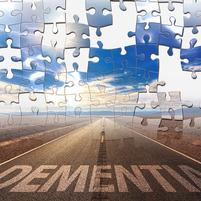The World Alzheimer Report 2024 was released by Alzheimer’s Disease International (ADI) on September 20th (Alzheimer’s Disease International 2024). This year’s report focused on the global changes in attitudes towards dementia. The report’s launch was celebrated publicly in an online seminar and was organized to commemorate World Alzheimer’s Month. Selected authors of the material highlighted in the report shared their findings or stories in a seminar. Of all the speakers that contributed, it was Brother (Br) John-Richard Pagan’s story that caught my attention and led me to write this blog.
Br John is a former US Navy veteran who now lives with early-onset dementia (EOD). During his short monologue, Br John discussed the struggles he faced after being honorably discharged from the Navy, including his battles with addiction and homelessness. Though it took him many years, he eventually overcame these obstacles successfully. When he returned to education to undertake a PhD in 2013, he noticed that he was falling behind in some classes despite having studied industriously. He found himself being unable to solve basic mathematical problems. This came as a surprise as he had not encountered any academic performance issues during his previous studies. He then sought medical help. However, in his quest to obtain a comprehensive diagnosis, he was pushed from one hospital to another and felt abandoned by medical professionals. This situation would continue for several years before Br John was finally diagnosed with Lewy body dementia. At the time of his diagnosis, Br John was in his 40s.
What Br John experienced was a blatant act of age discrimination. This is because his age prevented him from receiving the treatment that older adults (65+) would get had they had dementia symptoms. Dementia is widely recognized as a disease of old age. In Br John’s own words, ‘the biggest challenge for me was getting people to believe me’. Clearly, he was considered too young and too healthy to be suffering from cognitive impairments let alone clinical dementia.
While a deep-rooted stigma revolves around dementia, it is deemed more acceptable for a person in their 60s or older to have the condition. Although absurd, this view can hinder people from receiving early detection and prompt treatment, particularly those in their 30s to 50s. While dementia is strongly linked to older age groups, a growing number of studies have reported cases of early-onset dementia (EOD) in several European countries (Chiari et al. 2021; Kvello-Alme et al. 2020). For example, a recent study in Finland found that the rate of newly diagnosed EOD (incidence rate) was 20.5 in the 30-64-year-old age group, whereas in the 45-64-year-old age group the rate was 33.7 (Krüger et al. 2024). These figures mean that for every 100,000 people, we can expect an average of 21 to 34 more people being diagnosed with EOD every year depending on their age group.
If the current EOD trends continue, the challenges of living with cognitive decline may cease to be an exclusively older adult experience. Dementia generally occurs among older generations with grandparents having the highest risk in families consisting of three generations. However, the figures in the Finnish study imply that dementia could occur not only in the oldest generation but also in the middle generation (e.g., in parents with younger children). This means that in future decades we may see more cases of multigenerational dementia, that is, when two or more people from two different generations within a family experience the condition.
As dementia progresses to more severe stages, those affected by the condition will become more dependent on someone else for their overall care. The partner or children of the person with dementia usually carry the care burden. Nearly 41% of Alzheimer’s and other dementia carers in the U.S. were aged 50-64 years (Alzheimer's Association 2024). Indeed, the caring responsibility for those suffering from dementia will more often than not rest on the shoulders of older generations and their adult children.
However, increases in multigenerational dementia and EOD may mean that the care responsibility is passed down further to the sufferers’ grandchildren. If EOD incidence rates increase from today’s estimates, then the age of future carers would likely be younger than that of today’s carers. The fact that younger people may soon have a more significant role to play in tackling dementia-based issues indicates their vulnerability as prospective carers
Caring for people with dementia has been described as a laborious, health-debilitating, and life-altering experience by carers. Older carers often rely on other family members or close friends to share their care burden. For younger carers, the kinds of responsibilities that arise from dementia-based care would likely require more than simply the support of family and friends. Carers from the youngest generation may be engaged in establishing an independent life for themselves and as such may not have developed the mental, physical, and financial resources necessary for successful caregiving
A much larger social network will be necessary to satisfactorily meet and maintain the needs of those with dementia and their younger carers. The act of caregiving, particularly in the context of EOD, would entail the active involvement of broader social support. This could include schoolteachers and tutors, neighbors and residents’ associations, and co-workers and supervisors. While such carer support groups may be unable to provide 24/7 care and/or personal care (e.g., help with bathing, grooming, and dressing), they could assist with other forms of support that are crucial for daily survival (e.g., food shopping, light housekeeping, transportation, and companionship).
The inclusion of people beyond the confines of family and friends in care provision could result in many positive impacts. One major impact is that it may reduce the psychological and physical demands primary carers face. For them, this means that they can maintain lives beyond caring for their dementia-suffering family member. Allowing carers, especially those from younger generations, to establish solid identities and engage in building socially-embedded roles may decrease their susceptibility to poverty, loneliness, poor living conditions, and other adverse circumstances. Through interacting with people with dementia, those from outside the sufferer’s direct family network will have the opportunity to develop grounded knowledge about the condition. This could be a starting point for raising public awareness and may dismantle misconceptions about dementia. The more people that are involved the more dementia will be discussed openly. Caregiving activities may shift from being primarily home-based to something people engage in on streets, in parks and cafes, and in shopping malls.
It is important to state that having EOD does not mean that a person's life will change drastically immediately. Depending on the dementia’s progression, people with EOD can still go about their daily life without significant difficulties for years or even decades. Br John is an exemplary case of how people with EOD can remain an integral part of the societies in which they live. In short, people with EOD can live well in communities and work regular jobs.
Employing people with EOD in certain job roles such as customer service may be considered a risky enterprise. However, such apprehensions may stem from the stigma associated with dementia which is commonly portrayed negatively by the media. Conversely, companies that fail to acknowledge the value of employees with EOD might lose a huge customer-base. This is because customer demographics are changing due to population aging. Companies, particularly when conditions such as EOD are better understood, may have more older customers with diverse health experiences, including dementia. Therefore, by hiring and retaining employees with EOD, companies could expand their customer range. Employees with EOD may have more compassion and patience when engaging with older customers and/or those exhibiting signs of dementia. It is conceivable that this may result in these customers feeling more visible and that their voices are heard, and understood.
Companies could also improve the quality of life of employees experiencing EOD. Employment is one foundation for maintaining a dignified life. Being engaged in labor force activities is undeniably central to many adults’ sense of personal and social identity. Thus, enabling working-aged individuals with dementia to contribute to the economy and society for as long as their health permits represents a form of empowerment. In order for companies to establish a dementia friendly environment, they must commit to providing this for everyone whether customers or employees.
Changing society’s perspective on dementia can and must begin in workplaces. Various dementia-oriented organizations are offering training to different companies and industries in order to implement improved practices with customers presenting signs of dementia. For instance, Alzheimer’s Society UK delivers a course on communicating effectively over the phone with people living with dementia (Alzheimer’s Society 2022). Another example is a course in which employees obtain the skills to identify certain behaviors in people experiencing dementia.
Training of this kind should be conducted on a regular basis or at the very least, should be incorporated into the culture of most, if not all, service industry companies. Forming a standard operating procedure (SOP) for supporting customers with memory impairments or other severe dementia symptoms is another way that companies can ensure that their customers’ rights are maintained. In addition, the implementation of SOPs will help employees to serve their customers through making informed on-the-spot decisions. This sort of measure will in turn safeguard customers’ and employees’ well-being.
As we leave World Alzheimer’s Month behind, let us take Br John’s story as a reminder that there is still so much for us to do to tackle issues pertaining to dementia. Dementia is currently most prevalent in the older population. However, due to technological advancement and enhanced diagnostics tests, we may soon be able to detect more cases of young-onset dementia across the globe. Combatting stigma toward those experiencing dementia cannot be the sole responsibility of carers, affected family members and friends, charity organizations, and people in health-related industries. So far, breaking the stigma around dementia has been rather tricky as it consists of a combination of two main factors: misconceptions about dementia (the disease) and prejudices pertaining to older people (the disease’s host). A further misconception that needs to be addressed is the false belief that only older individuals are susceptible to dementia. Whether or not the reported EOD cases truly reflect real-world circumstances is a topic for further investigation. But we must not wait in silence without armoring ourselves against future developments: Dementia may soon be less about passing a certain age and more about the process of getting older itself, and that is something that we all have in common.
References:
Alzheimer’s Disease International. (2024). World Alzheimer Report 2024: Global Changes in Attitudes to Dementia. London, England: Alzheimer’s Disease International.
Chiari, A. et al. (2021) Epidemiology of Early Onset Dementia and its Clinical Presentations in the Province of Modena, Italy. Alzheimer’s & dementia. [Online] 17 (1), 81–88.
Kvello-Alme, M. et al. (2020) Incidence of Young Onset Dementia in Central Norway: A Population-Based Study. Journal of Alzheimer’s disease. [Online] 75 (3), 697–704.
Krüger, J. et al. (2024) Incidence and Prevalence of Early-Onset Dementia in Finland. Neurology. [Online] 103 (4), e209654-.
Alzheimer's Association (2024) Alzheimer’s Disease Caregivers. Available at: Alzheimer's Disease Caregivers (alzimpact.org) (Accessed: 16 October 2024).
Alzheimer’s Society (2022) Alzheimer’s Society Live Training. Available at: https://www.alzheimers.org.uk/dementia-professionals/external-training/alzheimers-society-live-training (Accessed: 16 October 2024).
About the author:
Kamilia Tanjung was a Visiting Student at the Oxford Institute of Population Ageing. She is a Doctoral Researcher at the Unit of Health Sciences and Gerontology Research Center (GEREC) at Tampere University, Finland.
Opinions of the blogger is their own and not endorsed by the Institute
Comments Welcome: We welcome your comments on this or any of the Institute's blog posts. Please feel free to email comments to be posted on your behalf to administrator@ageing.ox.ac.uk or use the Disqus facility linked below.













